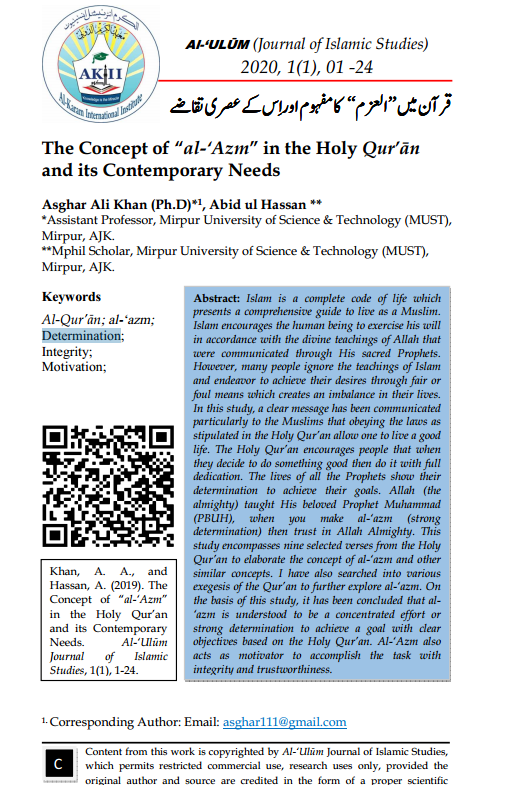قرآن میں ’’العزم‘‘ کا مفہوم اوراِس کے عصری تقاضے
The Concept of “al-‘Azm” in the Holy Qur’ān and its Contemporary Needs
Keywords:
Al-Qur’ān, al-‘azm, Determination, Integrity, MotivationAbstract
Islam is a complete code of life which presents a comprehensive guide to live as a Muslim. Islam encourages the human being to exercise his will in accordance with the divine teachings of Allah that were communicated through His sacred Prophets. However, many people ignore the teachings of Islam and endeavor to achieve their desires through fair or foul means which creates an imbalance in their lives. In this study, a clear message has been communicated particularly to the Muslims that obeying the laws as stipulated in the Holy Qur’an allow one to live a good life. The Holy Qur’an encourages people that when they decide to do something good then do it with full dedication. The lives of all the Prophets show their determination to achieve their goals. Allah (the almighty) taught His beloved Prophet Muhammad (PBUH), when you make al-‘azm (strong determination) then trust in Allah Almighty. This study encompasses nine selected verses from the Holy Qur’an to elaborate the concept of al-‘azm and other similar concepts. I have also searched into various exegesis of the Qur’an to further explore al-‘azm. On the basis of this study, it has been concluded thatal-‘azm is understood to be a concentrated effort or strong determination to achieve a goal with clear objectives based on the Holy Qur’an. Al-‘Azm also acts as motivator to accomplish the task with integrity and trustworthiness.

Downloads
Published
How to Cite
Issue
Section
License
Copyright (c) 2020 Al-‘Ulūm Journal of Islamic Studies

This work is licensed under a Creative Commons Attribution-NonCommercial-NoDerivatives 4.0 International License.

